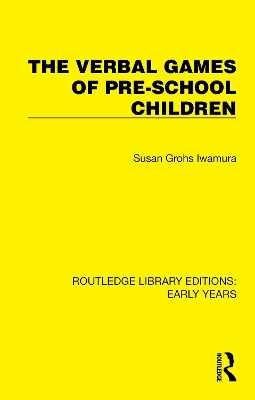
The Verbal Games of Pre-school Children
Seiten
2024
Routledge (Verlag)
978-1-032-35666-2 (ISBN)
Routledge (Verlag)
978-1-032-35666-2 (ISBN)
First published in 1980, this study is based on extensive and detailed observation of the verbal interaction of two pre-school children, and as such offers far-reaching ideas and conclusions concerning the manner in which all children determine the role of language in their lives, whilst simultaneously learning how to piece it together.
Originally published in 1980 The Verbal Games of Pre-school Children states that in the course of acquiring language, every child recognizes that verbal interaction is a powerful tool which can be used to interpret and manipulate the world.
During the last previous two decades developments in the study of both language acquisition and linguistic theory had begun to illustrate that the acquisition of a first language involves considerably more than the mere learning of grammatical structure. This view of learning had led researchers gradually to see children as more than grammarians devising grammatical constructs. The tendency at the time was to see the child as an active partner in what are essentially games of communication and invention during which the rules of usage as well as the rules of grammar are discovered.
This study is based on extensive and detailed observation of the verbal interaction of two pre-school children, and as such offers far-reaching ideas and conclusions concerning the manner in which all children determine the role of language in their lives, whilst simultaneously learning how to piece it together.
Originally published in 1980 The Verbal Games of Pre-school Children states that in the course of acquiring language, every child recognizes that verbal interaction is a powerful tool which can be used to interpret and manipulate the world.
During the last previous two decades developments in the study of both language acquisition and linguistic theory had begun to illustrate that the acquisition of a first language involves considerably more than the mere learning of grammatical structure. This view of learning had led researchers gradually to see children as more than grammarians devising grammatical constructs. The tendency at the time was to see the child as an active partner in what are essentially games of communication and invention during which the rules of usage as well as the rules of grammar are discovered.
This study is based on extensive and detailed observation of the verbal interaction of two pre-school children, and as such offers far-reaching ideas and conclusions concerning the manner in which all children determine the role of language in their lives, whilst simultaneously learning how to piece it together.
Prologue. Preface. 1. Introduction 2. Collection and Analysis of Data 3. Short Routines 4. Correction Activities 5. Antonym Games 6. The You Say Routine 7. The Hiding Game 8. Conclusions. Epilogue. Appendices. Bibliography. Index.
| Erscheinungsdatum | 20.09.2024 |
|---|---|
| Reihe/Serie | Routledge Library Editions: Early Years |
| Verlagsort | London |
| Sprache | englisch |
| Maße | 138 x 216 mm |
| Gewicht | 444 g |
| Themenwelt | Geisteswissenschaften ► Psychologie ► Allgemeine Psychologie |
| Geisteswissenschaften ► Psychologie ► Entwicklungspsychologie | |
| Geisteswissenschaften ► Sprach- / Literaturwissenschaft ► Sprachwissenschaft | |
| Sozialwissenschaften ► Pädagogik ► Vorschulpädagogik | |
| ISBN-10 | 1-032-35666-9 / 1032356669 |
| ISBN-13 | 978-1-032-35666-2 / 9781032356662 |
| Zustand | Neuware |
| Informationen gemäß Produktsicherheitsverordnung (GPSR) | |
| Haben Sie eine Frage zum Produkt? |
Mehr entdecken
aus dem Bereich
aus dem Bereich
Techniken der Verhaltenstherapie
Buch (2024)
Julius Beltz GmbH & Co. KG (Verlag)
35,00 €
Buch | Softcover (2024)
Hogrefe Verlag
34,95 €


